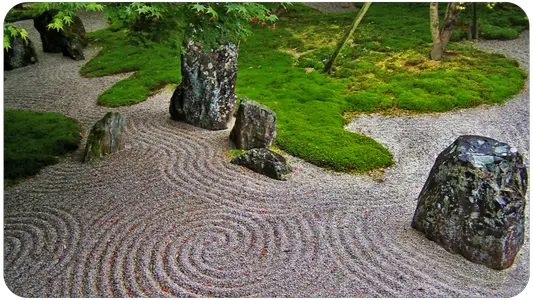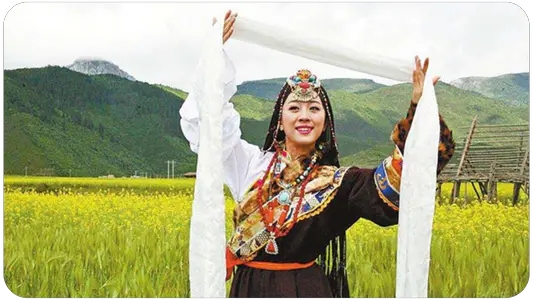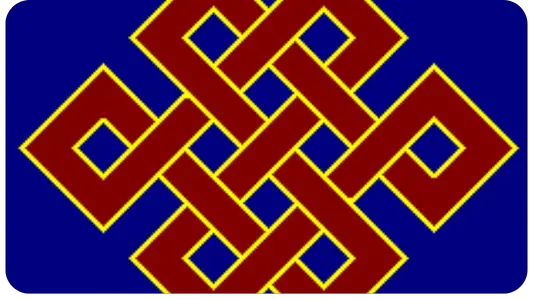Ananda (IAST Ānanda, Ch:阿難, A Nan) "Bliss" in Sanskrit, was the cousin and one of the ten principal disciples of the Buddha, whose personal assistant he was for twenty-five years.
As such, he is the one who collected the most words from Gautama, and was required at his death to recite the Pitaka Sutta so that the memory of it would not be lost. The legendary etymology of the term sutra (Pali: sutta) derives from the opening words of this type of text: evam me sutam (thus I have heard), which is said to date from Ananda's recitation.
Tradition describes him as a monk of high intellectual and spiritual level, but sometimes deviating from the rules or taking contested initiatives (such as persuading the Buddha to allow women to enter the orders), and yet always sympathetic. The Pali canon claims that he had no known enemies.
He is considered by the chan/zen current as its third patriarch after Shakyamuni and Mahakashyapa (Mahakassapa).
As with all of Siddhartha Gautama's companions, information about him is sometimes contradictory and questionable, especially that taken from the Jatakas, which is clearly legendary.
Various present-day historians, among many chronologies, date the events: 563 B.C. the Buddha and Ananda were born in the same year, 526 B.C. Ananda was a monk, 508 B.C. he was the personal servant (upasthâyaka) of the Buddha, 482 B.C. he was an arhant (meritorious) and recited the sutras (sermons) of the Buddha at the first Buddhist council.
Ananda was born on the day of the Buddha's awakening, which is why he was named Ananda, which means "joy". He was thirty years younger than the Buddha whom he served for 27 years.
Youth
Legend has it that he was descended from Tushita like Siddhartha Gautama and was born on the same day as him. His father was Amitodana, brother of Shuddhodana; his brothers were Mahānāma and Anuruddha. Another source claims that he was son of Suklodana and brother of Devadatta and Upadhāna. His mother's name was Mṛgī.
He entered the orders in the second year of the Buddha's preaching, along with many young men of the Sakya clan. He was ordained by Gautama himself, and his upajjhāya (guide to the monastic life) was Belatthasīsa. He soon attained the rank of sotāpanna.
After twenty years of having different monks as assistants in turn, the Buddha declared before the assembly that he had resolved to choose a permanent assistant. There were many candidates, but none of them received his favor. He then turned to Ananda and asked him why he had not come forward.
Gautama replied that he was interested, but only on eight conditions, which can be grouped into three main points: his cousin must never give him a gift or benefit that would make it appear that he had applied for the position for that reason;
he must delegate to him the right to accept invitations in his stead and to bring him visitors from afar; and he must answer all his questions and repeat all the teachings he had given in his absence. Gautama accepted.
Assistant to the Buddha
Ananda took his role to heart and was very attentive to changes in his master's tone or appearance, sometimes falling ill with him out of empathy. He intervened to save his life when his brother Devadatta wanted to throw an elephant against him.
The monks and laymen trusted him and often came to ask him for advice, or for clarifications on the preachings of the Buddha. Ananda would then take up or continue the preaching, approved and encouraged by Gautama. He also sometimes preached on his own initiative.
Buddhaghosa left a list of discourses attributed to him: Sekha, Bāhitiya, Anañjasappāya, Gopaka-Moggallāna, Bahudhātuka, Cūlasuññata, Mahāsuñata, Acchariyabbhuta, Bhaddekaratta, Mahānidā-na, Mahāparinibbāna, Subha, and Cūlaniyalokadhātu, as well as several exchanges with the other monks.
In his role as an intermediary he was diplomatic and kind. In order not to disappoint visitors who wished to leave offerings when the Buddha was away, on the Buddha's advice, he had a fruit brought from the bodhi tree. From the seed he grew an Ananda-bodhi in front of which pilgrims could leave their flower garlands.
He is particularly known for advocating for the women led by Mahaprajapati Gautami whom many, including the Buddha himself, did not wish to accept into the sangha. It is he who would have reminded his cousin that their spiritual capacities were not inferior to those of men.
On another occasion he would have questioned the wisdom of keeping them out of judicial assemblies and certain professions, and of denying them the full benefits of their religious efforts. Yet it is "female folly" that he invokes to calm Mahakassapa, another close disciple of the Buddha, when the latter is (once again) rebuffed by the nuns to whom he had come to preach.
They compare him unfavorably to Ananda, who is also the favorite preacher of the court ladies. This mutual favoritism will earn him reproaches during the first council.
Ananda actually had an excellent relationship with Mahakassapa, who was his main supporter at the first council, and also with Sariputta whose eulogy he composed. Moggallāna, Anuruddha and Kankhā Revata were also among his friends.
The Buddha publicly praised him before the assembly of monks at Jetavana, declaring him to be first in scholarship, behavior, memory, determination and attention. Shortly before parinirvana he added that Ananda always chose the right moment to bring visitors to him, and that he deserved his name well, knowing how to make all those who came to him happy.
When he began to distinguish in the physical aspect of his master signs of his near end, Ananda expressed his concern. The Buddha is said to have replied that he had once hinted to him that he could, at his request, live a whole kalpa, but that he had lacked intuition and let the opportunity pass.
At the beginning of the ninth chapter of the Lotus Sūtra, Ānanda and Rāhula are convinced that it would be wonderful to receive a prophecy of enlightenment. They respectfully express this to the Buddha, followed by two thousand of the listening disciples, both novices and confirmed, who reiterate this vow.
The Buddha announces to the monks that Ananda, as the guardian of the Law will attain proper enlightenment and become a Buddha under the name of Sāgaravaradharabuddhivikrīḍitābhijña whose "life span will be immeasurable, due to his compassion for living beings. "
To the large gathering, Shakyamuni explains that he and Ananda had resolved at the same time to attain anuttara-samyak-sambodhi. He himself, redoubling his efforts, had attained enlightenment, and Ananda, happy with his vast knowledge, was and will be guarding the Dharma's recesses.
He was of course close to the Buddha when he died and took charge of the funeral arrangements.
First Council
Shortly thereafter, a council was convened to fix the memory of the master's teachings. Most of the participants considered Ananda's presence indispensable, but he had not yet reached the necessary state of arahant, perhaps because his position prevented him from devoting as much time to this undertaking as his colleagues.
Encouraged by Mahakassapa, he set to work hard and reached the desired state in the middle of a wood near Kosala in a state of total exhaustion, as he collapsed to the ground.
This legend makes him known as "the one who did not reach the state of arahant in any of the four prescribed positions". It is said that he entered the council in extremis, flying through the air or rising from the ground to the cheers of Mahakassapa, and was immediately put to work.
Fortunately, he was said to have a phenomenal memory and spoke eight times faster than an ordinary person. He reportedly memorized 82,000 teaching topics from the Buddha and 2,000 from other monks.
Despite his contribution, Ananda had to endure reproaches concerning women, the Buddha's longevity, forgetting to ask which rules are more important than others, and also for once inadvertently stepping on Gautama's garment and going out himself once in improper attire. He apologized for this so that the council could end in harmony.
Parinirvana
The Pali canon has kept no record of his last moments but claims that he died at one hundred and twenty years of age. There is a legend reported by the Chinese monk Faxian: Sensing his end was near, Ananda set out for Vaisali with the intention of attaining parinirvana there.
Ajātasattu, king of Magadha followed him with a large escort to have the honor of keeping him company until he reached the Rohini River, but the king of Vaisali was waiting for him on the other bank. Not wanting to offend anyone, he entered the river and his body disappeared in flames in the middle. His remains were naturally divided into two and each had relics for which they built a cetiya.
Past lives
The Buddhist tradition considers that exceptional religious destinies require several lifetimes of practice and accumulation of perfections (parami), and also having expressed the vow to become an arahant, whose future realization is guaranteed by the Buddha of the current era.
Like many others in Gautama's entourage, it was in the era of Padumuttara Buddha, when he was Sumana, son of King Ananda of Hamsavatī, that he vowed, impressed by the dedication of Padumuttara's assistant, to one day have a situation similar to his own.
His rebirths recounted in the Jatakas (collections of accounts of Gautama's life)are very numerous. The Apadāna claims that he was before Gautama fifty-eight times king on earth and thirty-four times king in heaven.





